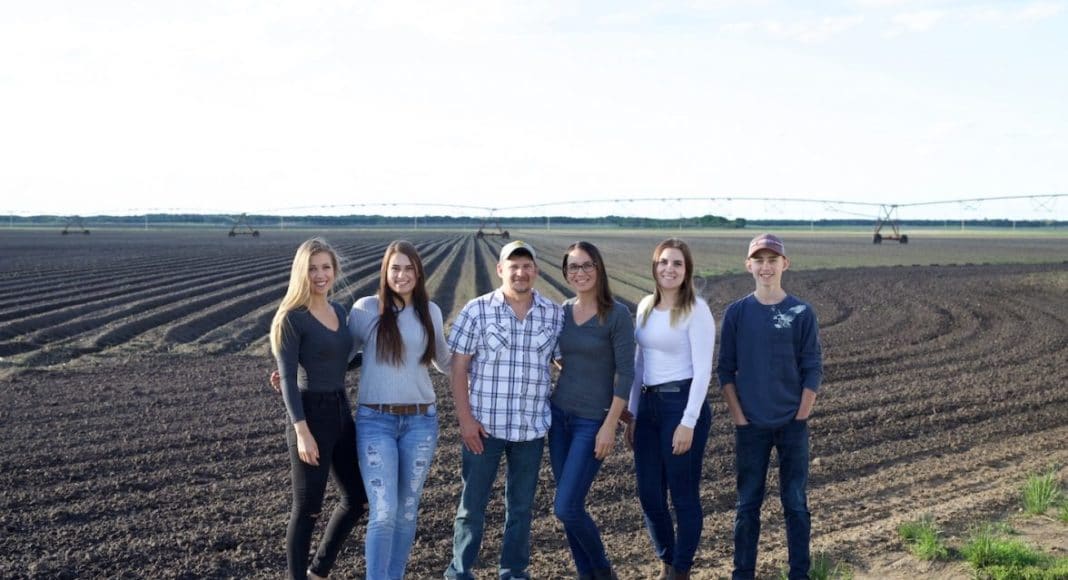Spud Plains Farms is one of the largest potato operations in Manitoba. The 15,000-acre farm includes about 4,500 acres of irrigated potatoes which are spread over out over 80 kilometres in the southwest area of the province.
Owner Paul Adriaansen believes for an operation of his farm’s size, it pays to be self-sufficient.
“We do as much as we can ourselves on our farm. We just purchased an aircraft last year, a new spray plane, so we’re doing all of our own spraying that way now,” he says, adding the farm also has an electrician and mechanics on staff, to save on outsourcing.
Adriaansen knows how to fly but he doesn’t pilot the spray plane himself. That’s done by Ben Friesen, who was hired for the job last year and who will fly the spray plane again this season. Friesen is a professional pilot from Belize who has dual Canadian citizenship.
“He also ran a potato digger for us last fall,” says Adriaansen. “He’s a good guy to have around.”
Adriaansen acknowledges buying and running your own spray plane is expensive and definitely not for every potato grower. “We have the acres that we can justify it,” he says.
Adriaansen’s can-do attitude extends to other areas as well. He recently purchased a nearby crop inputs retailer so he’s able to source his own fertilizer, blend and spread, dry and liquid. He also plans to build a 12-kilometre-long pipeline to supply irrigation water to some fields in an area where he’s unable to get the necessary water use permits.
In addition, Adriaansen likes to design and build his own potato storages, and he grows his own seed potatoes. The farm also supplies seed potatoes to two dozen or so other growers.
“If you do things in-house, you have a lot more control,” Adriaansen says. “I just like all of the challenges of it. It’s always interesting.”
Born into Potato Growing
Adriaansen has four kids aged 15 to 23 and lives with his wife of 24 years, Kim, in Wellwood, Man. He is one of seven brothers who were raised on a potato farm. “I was born into it.”
His parents Tony and Jo started farming in Manitoba in 1962 after immigrating from Holland. He and five of his brothers took over the farm in 1987, and 12 years later, Adriaansen and his wife started their own operation with just a few sections of land a few kilometres away from where he currently lives.
“When we went farming on our own, we had eight quarter-sections and now we’ve got it up closer to a hundred. We’ve done a lot of expansion in the last 20 years,” says Adriaansen, who credits much of his success to his hard working and dedicated staff as well as the values instilled by his parents.
Adriaansen grows Russet Burbank and Ranger Russet potatoes for both McCain Foods and J.R. Simplot Company. Since 1999, his farm has twice been chosen as top grower for the Carberry, Man. potato processing plant, first with Midwest Foods Products and then with McCain after it purchased the plant from Midwest. Adriaansen notes his farm is quite often on the top 10 growers list as well.
The farm uses practices like variable rate fertilization and fertigation to help ensure a good potato crop. Minimal tillage is also utilized to help prevent soil erosion, and potatoes are grown in a one in three-year rotation or longer to reduce disease pressure.
Adriaansen notes a big reason corn is included in the rotation is to boost organic matter and help retain moisture in the soil. The other rotation crops for the farm’s potato acres are wheat, rye and canola.
With the planned expansion of the Simplot processing plant in Portage la Prairie, Man., Adriaansen is planning to increase his spud production in the next few years by adding another 500 or so potato acres. He’s also building a new potato storage this year to accommodate added production.
Adriaansen, at 55, says he plans to keep farming until he’s 75. He believes the future is looking good for growers like himself who are able to provide an excellent product for potato processers in Canada and the U.S.
“Demand keeps going up in North America. We had a little bit of a lull there a few years ago, but demand certainly is going up now,” he says, adding that growth in exports of processed potato products to overseas markets is another encouraging sign.
“We sort of back-feed that U.S. market… and they are gaining ground on their ability to export as well, so that just helps our whole industry,” says Adriaansen.
“I think there’s a lot of potential. If you grow quality potatoes, you almost always have the marketplace.”











